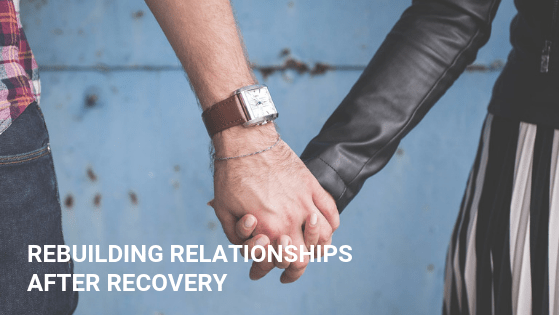
Rebuilding Relationships after Recovery
For those struggling with addiction, the road to recovery can be a long and challenging one. First and foremost the individual must take all the necessary steps to get sober. Acknowledgement of the addiction, getting oneself into and completing a treatment program and then accumulating one sober day after another are all vital steps toward a healthy productive life. However, even after sobriety occurs, the recovering person may be faced with the realisation that life is not immediately better. Something essential to ensuring long term sobriety is repairing broken or strained relationships.
Finding a way back into the trust and friendship of partners, family and friends does not occur overnight. It takes hard work, commitment and a lot of patience. Those who witnessed the decline may initially and outwardly appear happy that recovery is finally occurring, but often the strain in the friendship caused by destructive nature of the addiction has created deep seated feelings of resentment, mistrust and hurt. The illness may have included betrayals, broken promises and numerous disappointments. Additionally the relationships may have been damaged by legal or financial problems and sometimes domestic violence. The person(s) are often mentally and physically exhausted having experienced the illness along with the addict. So understand that there may be some amount of resistance.
The following are some helpful suggestions on how to mend fences and rebuild relationships and following drug and alcohol treatment:
The first step is to reach out to those people you wish to reconnect with. Let them know you are in treatment or have completed treatment for your addiction, as the case may be. Sometimes this may be initially easier done with an email or letter. Let them know you are in the process of getting your life back on track and that you would like them to be part of it. Tell them your communication from now on is going to be honest, direct and clear.
Make sincere apologies for your mistakes or deceits; be as specific as you feel you need to be for what has happened between you in the past and ask for forgiveness. Once you have asked for forgiveness do not keep berating yourself for past mistakes. You no longer have the power to change anything that has already taken place. You can only move forward from this point by making better decisions in your relationships from now on.
Be patient and realistic in your expectations. You may have extended the proverbial olive branch, but sometimes the damage has occurred over years and true forgiveness may take time as well. Allow the other person to express their anger and disappointment. Take their feelings seriously. Don’t make excuses and try not to be defensive.
Work on your communication skills. Practice listening and responding calmly, without judgment. Make a commitment to be trustworthy by standing by your word. Letting your actions show your family or friend that you are seriously trying to be better. Be open and transparent in order to regain trust. This may include telling a partner or friend exactly where you’re going at all times, who’ll you’ll be with, and what you’ll be doing. Show them you are not harbouring secrets. Openness is necessary especially in the early days after you’ve completed drug and alcohol treatment.
Take time to rebuild a positive structure to your life. Eliminate toxic relationships with co-dependants that have yet to come to grips with their own addictions. This is vital to avoiding relapse. If possible, get back to work. Spend quality sober time with family, your children and friends. Let them know how much you appreciate their support and friendship through tough times. Engage in healthy activities and seek out hobbies.
Finally, keep attending relapse prevention meetings as well personal or marriage counselling or sessions. Friends and family members need to see you “walking the walk” to demonstrate that you are serious about your recovery. In time with patience, understanding and perseverance they will come around.
At Ibiza Calm, we have an expert team of professionals available at all times so please do not hesitate to call us if you need any help or advice or if you feel a loved one does. Please call us on :
Share this information, choose your platform!
Tips for staying safe and sober during the holidays
The holiday season is upon us, and what is a fun time for some – with parties and get-togethers – for others it can be difficult, fraught with emotion and expectation; and for those in recovery, it can be a …
Is sex addiction real?
In the second season of the Emmy award-winning HBO series, “The White Lotus”; Michael Imperioli plays Dominic Di Grasso, a successful Hollywood producer with a sex addiction who has destroyed his marriage by repeatedly cheating on his wife. It is …
Addiction Transference
Addiction replacement or transference is classified by an individual in recovery substituting one addiction for another. This typically occurs during or after the treatment process for the original addiction. When a person enters treatment for addiction to drugs, alcohol, gambling …
Side effects of the UKs most popular illegal drugs
Figures published earlier this year, by the Home Office, show that cannabis and cocaine continue to be the most popular illegal drugs in the UK. Amphetamines have become more widespread in the north of England and nitrous oxide use has …









